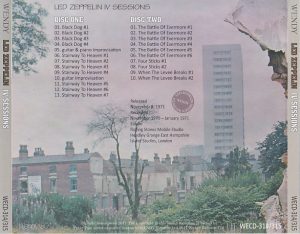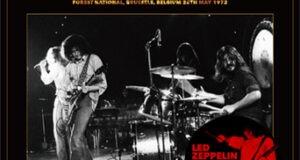Led Zeppelin / IV Sessions / 2CD With OBI Strip / Wendy Label
Translated Text:
Released November 8, 1971. Recorded Nov 1970-January 1971 Studio, Rolling Stones Mobile Studio, Headley Grange East Hampshire Island Studios, London. Digitally Remastered
Click Image To Enlarge
In the album of Zeppelin, the session sound source of the 4th album which was the most successful in sales was recorded. Recording was done at the Rolling Stones mobile studio, not only was it able to concentrate on recording without considering time and expense, it is told that page has entered a special outside feeling with its unique sound. Recording was intensively performed from the end of 1970 to the spring of 1971, and it was released in November of 1971. Below, “take” conforms to the track of this work and I want you to keep in mind that it differs from “take” in the name of actual studio.
【BLACK DOG】
Here, 4 takes is recorded. The first two takes can know the process of completing the riff with an acoustic guitar. Basically it is a repetition of that familiar riff, but you can see that Paige draws up the rhythm with his feet and is drawing up. After take 3 is a session sound source in the studio all together. Although the basic form is fixed, the songs are still in an incomplete state, the plant sings lightly and the band seems to be strengthening the performance accordingly. I heard that the songs are trial and error, with consideration for the middle part as well as remarkably incomplete.
【GUITAR & PIANO IMPROVISATION】
It is improvisation performance by acoustic and keyboard. While being improvised, there is a neat melody, you can hear that songs will be made from such improvisation. The impressive melody and the melody are beautiful, and it would be fun to imagine what kind of masterpiece was born as it develops from here. Unlike Takes 1 and 2 of the aforementioned “BLACK DOG” that was later transformed into an electric arrangement, it is such a song with such an atmosphere that those who remain in this way will live with the acoustic arrangement.
【STAIRWAY TO HEAVEN】
In-between guitar’s in-take and take, 7 total take is recorded. Take 1 is due to Akogi and Elephi. It is very interesting that picking method which is not included in release · take is adopted, and finally includes omitted melody. Moreover, it loops again to the intro melody on the way, it is the first stage “stairway to heaven”. Take 2 is a performance from the middle part that encourages the expectation that the song just rises the stairs. It is still played only by Akogi and Elepi. You can hear a talking voice in the back, but the Lord of Voices will be a plant and Bonzo who are not participating in the performance. The riff just before the song goes to the guitar solo is played though it is short. Take 3 is the latter part of it. You can see that Paige explains it with mouth. Although it does not include guitar solos because it is a performance by Akogi, it is recorded in a glimpse of how to do the second half of the song and trial and error it. And Take 4 is the part of the first half and the second half where the composition of the song is finally being completed. At this point it can be said that almost basic parts have been completed. It is actual singing from take 5. If you listen to it, this song seems to have been made in advance of melody and song composition, the lyrics are really incomplete and the songs of plants tend to be disrupted, sometimes flowing in humming, lyrics different from release versions I am aware that singing is singing. Take 6 is a song that has evolved considerably, but it still does not go out of the incomplete range. Especially lyrics are totally different things, and somewhat badness is noticeable. Also on the interlude part, we have unreleased lyrics on the melody that the guitar plays, which is interesting as one of the production process of this song. However, even though such incomplete, the beauty of the song can not be hidden, there is a charm to listen to. Take 7 is that lyrics that you are accustomed to listening to, it is just a rehearsal take that is just before completion. The interesting point is that excessive guitar is added at the bridge part to the guitar solo. Although it was natural that it was cut in the end, it is surprised by the guitar sound that appears unnaturally on the front.
【THE BATTLE OF EVERMORE】
This song is a duet music whose melody is beautiful by Celtic who determines the atmosphere of the album. Take 1 and take 2 are solo plants, and in the release version the plant is also singing part of Sandy Denny. Take 3 is also close to release versions with Sandy’s participation, but since it is a performance track, it is almost karaoke overall. Take 5 is a mix of vocals on the front, on the contrary, exquisite multiples of Sandy ‘s plants and something like a curse ceremony will be held in front of me. Take 6 and Tec 7 are almost the same as completion. It is a song with a complicated vocal composition, so it seems that the rehearsals have been repeated many times in this way.
【FOUR STICKS】
Here two take is recorded. It is quite a noisy and busy song. Take 1 is a take that superimposes a guitar on a rhythm track. Vocals have not been superimposed yet. Take 2 recorded from the discussion at the studio is recorded from the state of carving a rhythm like that impressive samba. It is Paige that puts a count. It is a take that you can see well that the plant desperately sings.
【WHEN THE LEVEE BREAKS】
It is a cover song that arranged blues’ already-released music in a Zeppelin style. The original song was an old song released in 1929 and probably was adopted with the hobby of the plant reflected. The first take is not echoed by vocals, it is recorded in a really raw state. The song is in a state of completion. Take 2 does not fade out and a really magical ending is added.
【LED ZEPPELIN IV SESSIONS】
This work contains all the session sound sources whose survival is confirmed with respect to the Zeppelin’s fourth album. It is Zeppelin showing various approaches at the live stage, but supporting the performance at the stage is a studio recording that was made with contemplation like this in this way. It is a valuable sound source that catches glimpses of the process of making songs that is still known as Rock ‘s Classics. Permanent preservation of a beautiful picture / disk specification A tightly pressed press.
ツェッペリンのアルバム中、セールス的に最も成功を収めた4枚目のアルバムのセッション音源を収録している。レコーディングはローリングストーンズのモバイル・スタジオで行なわれ、時間や費用を考慮することなくレコーディングに専念できたのみならず、その独特なサウンドをペイジは殊の外気に入ったと伝えられる。録音は1970年の年末から1971年の春頃にかけて集中的に行なわれ、1971年の11月にリリースされている。以下「テイク」というのは本作のトラックに準拠し、実際のスタジオの呼称における「テイク」とは異なる点を留意して読んでいただきたい。
【BLACK DOG】
ここでは4テイク収録されている。最初の2つのテイクはアコースティック・ギターにてリフを完成させていく過程を知る事が出来る。基本的にあのお馴染みのリフの繰り返しなのだが、ペイジが足でリズムをとりつつ練り上げていくのがわかる。テイク3以降は全員揃ってのスタジオにおけるセッション音源である。基本的な形は決まっているものの曲はまだ未完成の状態で、プラントは軽く歌入れしバンドがそれに合わせて演奏を固めているようだ。曲は著しく未完成ながらミドル・パートも視野に入れて試行錯誤しているのが伺い知れる。
【GUITAR & PIANO IMPROVISATION】
アコースティックとキーボードによる即興演奏である。即興でありながら、きちんとしたメロディがあり、このような即興演奏から曲が出来ていくのだろうことが伺える。印象的なメロディで曲調も美しく、ここから発展するとどのような名曲が生まれただろうかと想像するのも一興であろう。後にエレクトリック・アレンジに変貌した前述の「BLACK DOG」のテイク1と2とは異なり、このままアコギ・アレンジのままの方が活きる、そんな雰囲気を持つ曲である。
【STAIRWAY TO HEAVEN】
途中ギターのインプロ・テイクを挟み、計7テイク収録されている。テイク1はアコギとエレピによるもの。リリース・テイクには含まれないピッキング手法が採り入れられていたり、最終的に割愛されたメロディが含まれているなど非常に興味深いものである。しかも途中で再びイントロ・メロディにループするなど、最初期の「天国への階段」である。テイク2は曲がまさに階段を昇っていくような期待感を煽るミドル部分からの演奏である。ここでもまだアコギとエレピのみの演奏である。バックで話声が聞こえるが、声の主は演奏に参加していないプラントとボンゾであろう。短いながら曲がギターソロへ向かう直前のリフも奏でられる。そしてテイク3はその後半部分である。ペイジが「たらら~」と口で説明しているのがわかる。アコギによる演奏なのでギター・ソロは含まれていないが、曲の後半をどのようにするか、それを試行錯誤している様子が克明に収録されている。そしてテイク4はいよいよ曲の構成が完成しつつある、前半と後半の繋ぎ目の部分である。この時点でほぼ基本的な部分は完成したと言えるだろう。テイク5からは実際の歌入れである。聴けばわかるが、この曲はメロディと曲構成が先行して作られたようで、歌詞は本当に未完成でプラントの歌も途切れがちで、ところどころハミングで流したり、リリース・バージョンとは異なる歌詞で歌っているのが耳目を引く。テイク6はかなり曲が進化しているが、それでもまだ未完成の域を出ないものである。特に歌詞は全く別物で、幾分収まりの悪さが目に付く。また間奏部分でギターが奏でるメロディにまで未発表の歌詞を乗せており、この曲の制作過程のひとつとして興味深い。しかしこのような未完成でも曲の美しさは隠すことが出来ず、聴き入ってしまう魅力がある。テイク7は聴き慣れたあの歌詞で、まさに完成目前のリハーサル・テイクという趣である。面白いのはギターソロへのブリッジ部分で過剰なギターが加えられている点であろう。最終的にカットされたのは当然だが、不自然に前面に出てくるギター音に驚かされる。
【THE BATTLE OF EVERMORE】
この曲はアルバムの雰囲気を決定づけるケルティックがメロディが美しいデュエット曲である。テイク1とテイク2はプラントの独唱で、リリース・バージョンではサンディー・デニーのパートだった部分もプラントが歌っている。テイク3はそのサンディーも参加してほぼリリース・バージョンに近いが、演奏トラックなので全体的にほぼカラオケ状態である。テイク5は逆にヴォーカルが前面に出たミックスで、まるで呪いの儀式のようなプラントとサンディーの絶妙な掛け合いが眼前で繰り広げられる。テイク6とテク7になると、ほとんど完成と同じである。複雑なヴォーカル構成を持つ曲なので、こうして何度もリハーサルが繰り返されたのだろう。
【FOUR STICKS】
ここでは2テイク収録されている。かなり騒がしく慌ただしい曲である。テイク1はリズムトラックにギターを重ねているテイクである。ヴォーカルはまだ重ねられていない。スタジオでのディスカッションから収録されているテイク2は、あの印象的なサンバのようなリズムを刻む様子から収録されている。カウントを入れているのはペイジ。プラントが必死で歌っているのがよくわかるテイクである。
【WHEN THE LEVEE BREAKS】
ブルースの既発曲をツェッペリン風にアレンジしたカバー曲である。原曲は1929年に発表された古い曲でプラントの趣味が反映されての採用だったのだろう。最初のテイクはヴォーカルにエコーがかけられておらず、実に生々しい状態で収録されている。曲は完成している状態のものである。テイク2はフェイドアウトせずに実に不思議なエンディングが加えられている。
【LED ZEPPELIN IV SESSIONS】
本作はツェッペリンの4枚目のアルバムに関して残存が確認されている全てのセッション音源を収録している。ライヴ・ステージにおいて様々なアプローチを見せてくれるツェッペリンであるが、そのステージでの演奏を支えているのが、このように熟考を重ねて作り上げられたスタジオ録音である。今でもロックのクラシクスとして知られている楽曲の制作過程を垣間見る貴重な音源である。美しいピクチャー・ディスク仕様の永久保存がっちりプレス盤。
DISC ONE
01. Black Dog #1
02. Black Dog #2
03. Black Dog #3
04. Black Dog #4
05. guitar & piano improvisation
06. Stairway To Heaven #1
07. Stairway To Heaven #2
08. Stairway To Heaven #3
09. Stairway To Heaven #4
10. guitar improvisation
11. Stairway To Heaven #5
12. Stairway To Heaven #6
13. Stairway To Heaven #7
DISC TWO
01. The Battle Of Evermore #1
02. The Battle Of Evermore #2
03. The Battle Of Evermore #3
04. The Battle Of Evermore #4
05. The Battle Of Evermore #5
06. The Battle Of Evermore #6
07. Four Sticks #1
08. Four Sticks #2
09. When The Levee Breaks #1
10. When The Levee Breaks #2
Wendy Label. WECD-314/315
 GiGinJapan Artwork of Japanese CDs (mostly)
GiGinJapan Artwork of Japanese CDs (mostly) 




